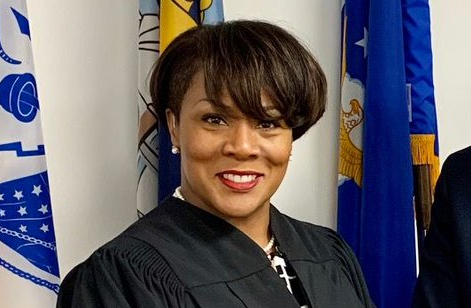|
|
|
|
|
|
 |
|
|
“It's a
new day
at 36th
District
Court —
there is
help
available.
We urge
everyone
involved
in the
criminal
justice
system
to take
advantage
of this
opportunity
to see
habitual
offenders
connected
to
needed
services,”
says
Judge
Shannon
Holmes,
who
presides
over
specialty
court.
(Photo
credit
toTwitter
post) |
| |
Specialty
court
changes
the
lives of
repeat
offenders
Detroit
judges,
police,
attorneys
and
therapists
partner
to solve
criminal
behavior
Posted
by
Wendell
Bryant
tellusdetroit.com
DETROIT
- Every
month
some 20
defendants
— many
habitual
— are
given a
life-line
when
they are
referred
to the
specialty
court
diversion
program.
Judges
who see
habitual
offenders,
police
who
identify
a drug
or
mental
health
problem,
and
other
courts
outside
Detroit
refer
people
whose
criminal
behavior
is a
result
of
underlying
issues
that
require
addressing
before
the
person
can move
on with
their
life.
The
specialty
court
offers
services
including
mental
health
assessment,
drug
treatment,
and a
comprehensive
and
coordinated
treatment
plan
that
includes
input
from the
defense
attorney
and
prosecutor.
There is
also a
human
trafficking
docket
where
specialty
court
judges
can
provide
the
counseling,
mentoring
and
other
services
necessary
to
address
the
specific
needs of
those
seeking
to
rehabilitate
their
lives.
“It's a
new day
at 36th
District
Court —
there is
help
available.
We urge
everyone
involved
in the
criminal
justice
system
to take
advantage
of this
opportunity
to see
habitual
offenders
connected
to
needed
services,”
says
Judge
Shannon
Holmes,
who
presides
over
specialty
court.
“And
it’s a
lifetime
commitment,
because
when
they
leave
our
program,
or are
no
longer
within
the
court
system,
we
continue
to reach
out to
provide
support.”
Stefani
Horenstein
was told
about
specialty
court by
the FBI
agent
who
arrested
her
while
investigating
human
trafficking.
“He said
that he
could
put me
in a
specialty
court
with a
very
strict
judge
and it
was
gonna be
very
hard.
But he
promised
me if I
did the
program
that I
would
get the
help I
needed,
so I
agreed.”
Horenstein,
who is
now
working
at a
mental
health
crisis
home and
training
as a
recovery
coach,
praises
every
aspect
of the
program.
She says
Judge
Holmes
“saved
my
life,”
and that
the
judge
and her
staff
show
genuine
love and
support,
like a
family.
Horenstein
also
praises
court
advocate
Alice
Johnson
as “100
resources
in one”
and says
her
group
therapy
sessions
were
life-changing.
She
received
in-patient
treatment
at
Detroit
Rescue
Ministries’
Genesis
House
and
transitional
out-patient
services
at
Lighthouse
in
Canton.
After
decades
of drug
use and
mental
health
issues,
“I have
a new
life
right
now. I’m
back in
society
and I'm
back
with my
family.
I'm
living a
happy
normal.”
The 36th
District
Court
Chief
Judge
William
McConico
created
the
specialty
court to
rehabilitate
people
like
Horenstein
in order
to
divert
eligible
non-violent
offenders
from the
criminal
justice
system
by
properly
addressing
their
needs
with
comprehensive
wraparound
services.
“We have
secured
grant
monies
from the
U.S.
Department
of
Justice,
among
others,
to be
able to
take
care of
a full
range of
social
and
interpersonal
needs
that
keep a
person
in the
criminal
justice
system,”
McConico
said.
“We are
committed
to using
specialty
courts
to serve
the
larger
community
by
providing
the
guidance
and
resources
needed
to
overcome
the
issues
that
have led
many to
become
repeat
offenders.”
Jon
Visintainer
overdosed
while
driving,
just
before
the
pandemic,
and says
he had a
history
of
depression
and post
traumatic
stress
disorder
(PTSD).
This was
his
second
arrest,
so he
was
offered
the
treatment
court
option
to
address
his
mental
health
needs.
He says
this
court
“is a
lot more
treatment-focused
rather
than
punitive-focused,
because
when
you're
dealing
with
people
with
mental
health
and
substance
abuse
issues,
life
circumstances
can
change
and
there
can be
bumps in
the
road.”
Visintainer
says the
team
approach,
with
case
manager
Jasmine
Taylor,
and help
from
prosecutors
and
defense
attorneys
made all
the
difference
in his
successful
transition
out of
the
criminal
justice
system.
“You can
slip up,
and the
first
thing
they do
is get
you back
into
treatment.
They
don't
throw
you
away,”
he says.
“My life
is the
most
positive
and I
feel
like my
mental
health
is in
the best
shape
it's
been for
as long
as I can
remember.”
Specialty
court is
made up
of a
drug
treatment
court,
mental
health
court,
street
outreach
court
and
veterans
treatment
court –
each
operating
to meet
the
unique
needs of
the
individuals
who come
before
it. The
drug and
veterans
courts
have
been
singled
out by
the
National
Association
of Drug
Court
Professionals
as
mentor
courts,
selected
to
conduct
trainings
around
the
country
by
providing
technical
assistance
on best
practices.
The
courts
are also
aligned
with the
Michigan
Association
of
Treatment
Court
Professionals.
“They
were
created
to stop
a
revolving
door,”
says
Director
of
Probation
Wright
Wade.
“Specialty
court
focuses
on what
is
causing
this
person
to
reoffend
and most
often
the
common
denominator
is some
type of
an
addiction.”
Advertise With Us:

Certified Minority Business Enterprise

|
|
|
|
|
|
|
|
|